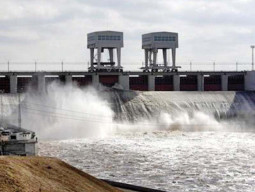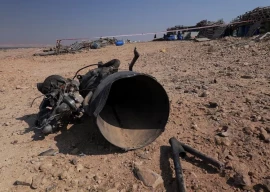Shortly, before he committed suicide in 1949, US Secretary of Defense James Forrestal was said to have run out in the street screaming, “The Russians are coming, the Russians are coming”, and alternatively, “The Russians are attacking! They’re right around. I’ve seen Russian soldiers”. Whether the episode actually happened is disputed (as is how he died), but at a time when the world had yet to adjust to the realities of the Cold War, Harry Truman’s manic defense secretary captured the country’s mood well.
In Pakistan, the same mindset continues to inform state policy — and some of it with valid reason. In 1979, the Russians were actually coming. Ten years later, the last Soviet tank limped out of Afghanistan, the empire fell in on itself and the US came out in celebration of the jihadist victory. But the world had already begun changing and Khomeini’s fatwa against Salman Rushdie would send the West running right back. The Cold War was over, as were the many realities it had once held firmly in place.
Since then, Pakistan has often stood still, while its neighbourhood and beyond, progressed. In most cases, the progress has been achieved only through hard paradigm shifts. India’s market liberalisation transformed a country that was tottering near bankruptcy in 1991, but it took a rejection of Jawaharlal Nehru’s socialist model to do it. Bangladesh, despite awful governance, recovered from the world’s waning dependency on its jute crop by bolstering its garment industry instead. Even Burma had to upend its own status quo before being taken seriously, releasing Aung Sun Suu Kyi and rushing through political reform.
The only thing common to all were re-evaluated priorities, which sometimes meant painful breaks with the past. But Pakistan’s policymakers lack the will for reconsidering their priorities, paradigm shifts, or the novel thinking they require. Their paralysis is embodied by this government: a four-year-long celebration of subsistence. To survive is to achieve and while the economy at home is alternately described as ‘on the brink’ or ‘in freefall’, isolation abroad grows.
With no dearth of issues in need of fresh ideas — Balochistan, the economy, law and order — signs of thinking out of the box should be welcomed. And there are several within Pakistan’s foreign relations. The government, the opposition and the military are reaching a consensus that a healthier relationship with India is a good idea or, if nothing else, that a perpetual state of conflict with it is a bad one. And, in an even rarer development, the Cold War frigidness between Pakistan and Russia seems to be thawing. President Vladimir Putin may become Russia’s first head of state to visit the country. Cooperation over gas pipelines, steel mills, energy and education are all said to be under discussion.
For some, this is less a careful paradigm shift than a hasty recalibration as ties with the US collapse. Call it whatever you like; if inching towards Russia marks a wave of fresh thinking, it should be embraced. And while these pages often advocate the Turkish way of doing things, too few have drawn attention to its ‘zero problems with the neighbours’ foreign policy. Since 2002, Turkey has embarked on a series of diplomatic initiatives that have seen it re-engage with the region around it, while projecting itself as a mature democracy. But its policy successes haven’t kept Turkey’s support for people’s aspirations hostage: it is Turkey’s voice that has been among the loudest, calling for Syrian President Bashar al-Assad to stop massacring his own people. ‘Zero problems’, then, has proven fluid enough to accommodate a volatile neighbourhood.
For Pakistan, a similar repositioning of its place in the world (and one not hyphenated with Afghanistan’s) is what’s required. It’s a nation of 180 million people that can no longer view its interests solely through the prism of other countries. The Russians are coming, this time with benign intentions. It’s up to our policymakers to seize the opportunity or, at the very least, finally begin thinking about creating new ones.
Published in The Express Tribune, June 29th, 2012.
COMMENTS (28)
Comments are moderated and generally will be posted if they are on-topic and not abusive.
For more information, please see our Comments FAQ














































@Arindom: would you change in your text books that Pakistan is still part of india??....i wish i could find link to related news published in toi
@BlackJack: the policy is btter for global peace....one can not imagine an iraq or afghan war had earstwhile USSR not disintegrated.
Pakistan must be flexible in its policies and pursue friendship with all its neighbors. Given our internal differences we cannot stand up to all these imaginary enemies.
Pakistan - Russia friendship will blossom again. And it won't need a steel mill this time.
Basically, in the world of 2012, no one helps anyone unless that person shows serious committmant to reform and change. European Union is helping member states such as greece, spain, italy,portugal cypress because they are all europeans, anmd need each other. yet each country is accepting huge change, austerity and reform. Bottom line is that people help those who help themselves. Pakistan has to heklp itself. It has to fight its own war on terror and make paradigm shift in its foreign and domestic policy. unless it starts dissassociating from non state actors at the earliest, it is doomed to implode. India, Bangladesh, now Burma have made 180 degree shifts in policy and to start again. Pak needs to desperately do the same. else it will be doomed as another afganistan.
Be careful, like most people Russians want to make money and don't forget the Russian mafia. Look what happened to that guy investigating atrocities in Chechnya who was poisoned in a sushi restaurant in London.
Good! Now your new master is our closest partner
Great piece. Russia may be corrupt, but Pakistan has no lack of its own image problems. Economic restructuring and reaching out in foreign relations is something Pakistan needs but doesn't do.
The Russian connection is most important if Pakistan has to overcome the present difiicluties caused by US occupation of Afghanistan and its fall out. Improving relations with India is also in mutual interest of not only India and Pakistan but also countries of the Central Asain region to develop trade and energy corridors benifiting people of the region. The impediments by US in this can only be overcome by joint efforts by countries of the region in wich Russia has a crucial role to play. Overall these are very welcome developments.
From a hyphenated relationship with India, to a hyphenated relationship with Afghanistan, sums up how 'far' has Pakistan traveled in the international arena.
The key to a journey elsewhere is internal. Neither 'all weather friend' nor 'ex friend now enemy' nor 'ex Dushman now tentative friend' is going to do for Pakistan, what Pakistan must do for itself. Let the beginning be made with the Chechens and Uighurs in NWA.
strange thoughts
I agree with the authors opinion that a paradigm shift in everything Pak does is need to make a change in Pakistan. But the only paradigm shift that is happening is more religious belicosity, bigotry and arabisation. Otherwise the begging attitude continues with Pak trying to get loans from SCO, free pipelines from Iran and Russia and so on.
So after spending more than a decade condemning Russia for butchering Muslims in Chechnya we now try to become best friends with a dictator (Putin) and his kleptocratic corrupt state. Russian state expenditure has been based on the basis of oil being $120 a barrel. It hasnt been at that levels for months and it continues to fall. Its a shrinking population with a creaking infrastructure and poor human resources. Took about betting on a poor horse.
I didn't see the writer saying anywhere for RUS to dole out dollars or for new military alliance. it says that a better relationship with russia is just a good idea. if pakistan is to succeed, it must step away from its history. and from people saying better relations means it just wants new paymasters.
A journey of a thousand miles will start with a small step - reform the anti-India, jihadist text books at your schools first....
The writer is spot-on, Asad's one of few that makes sense, but with Raja Rental around, the last thing the government is worried about is its place in the world, more like pvt helipads at taxpayers expense.
"The Russians are coming, this time with benign intentions." Its so naive on the part of the author to think they are here to dole us dollars, to pamper us with investments, to hand wrap us goodies. Strategically, Russia is very closely aligned with India and Economically it is part of BRIC where focus is to become economic superpowers like China and India. It is here to make profit and but main purpose is to make sure its own backyard, the Central Asian Countries are not polluted by Pak and its non state actors post 2014. Russians surely have not forgotten thousands killed by Pak few years back. Our urge to punch above our limits will once again put us in trouble.
From Russia with love"Ten years later, the last Soviet tank limped out of Afghanistan, the empire fell in on itself and the US came out in celebration of the jihadist victory" Once again, why did the Soviet Union collapse? Hint: it was their economy and not the mujahideen.
"The Russians are coming, this time with benign intentions". Don't tell me that the Russians are going to share the Brahmos and Sukhoi/HAL Fifth Generation Fighter Aircraft (FGFA) technologies with Pakistan next.
Russia under Putin is pursuing a confrontationalist policy vs the West, and will not toe the line on states with which it has long had warmer relations than the US - these include Syria and Iran, where Western desires for proactive intervention are tempered by Russian/ Chinese realpolitik. However, on Afghanistan all the world powers see eye-to-eye - none of them recognized the Taliban regime during the 1996-2001 period, and Russia wishes to protect its flanks from Islamic extremism that could see a resurgence in the region if Afghanistan falls back into civil war. Good relations is always desirable, but Russia will neither provide military or financial aid to Pakistan nor shield it from potential comeuppance for any adventurism in Afghanistan or India - and if these are the expectations on which this new relationship is being founded, they are likely to be revised rather soon.
Instead of solid internal reforms, you are again talking of finding a foreign patron. No foreign alliance can magically take us out of the mess. Foreign relations are a reflection of internal strength. After US withdrawal, a civil war will start; and Russia will support Northern Alliance against Taliban. Without getting rid of 30 year old jihadi policy, nothing can change.